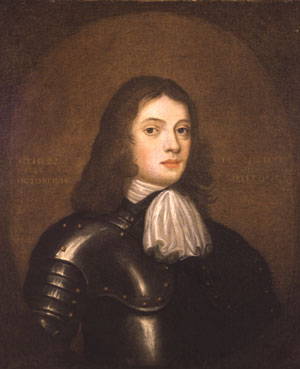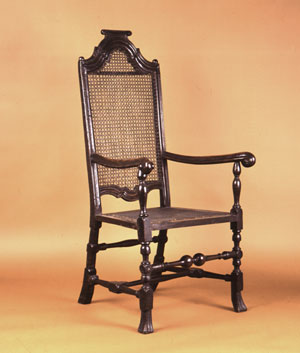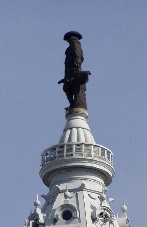Quotations from William Penn
The essence of the man
"I expect to pass through this world but once. Any good therefore that I can do, or any kindness or abilities that I can show to any fellow creature, let me do it now. Let me not defer it or neglect it, for I shall not pass this way again."
"Right is right, even if everyone is against it, and wrong is wrong, even if everyone is for it."
"A good end cannot sanctify evil means; nor must we do evil, that good may come of it...To do evil that good may come of it is for bunglers in politics as well as morals." (From Some Fruits of Solitude)
"Force may make hypocrites, but it can make no converts." (Letter to Lord Arlington, while imprisoned in the Tower)
"The humble, meek, merciful, just, pious and devout souls everywhere are of one religion and when death has taken off the mask, they will know one another, though the diverse liveries they wore here make them strangers."
"There is a zeal without knowledge, that is superstition. There is a zeal against knowledge, that is interest or faction; there is a zeal with knowledge, that is religion; and if you will view the countries of cruelty, you will find them superstitious rather than religious. Religion is gentle, it makes men better, more friendly, loving and patient than before."
"Did we believe a final Reckoning and Judgment; or did we think enough of what we do believe, we would allow more Love in Religion than we do; since Religion it self is nothing else but Love to God and Man. Love is indeed Heaven upon Earth; since Heaven above would not be Heaven without it: For where there is not Love; there is Fear: But perfect Love casts out Fear. Love is above all; and when it prevails in us all, we shall all be Lovely, and in Love with God and one with another."
Penn on Government
These statements, now the commonly held beliefs of most Americans, were revolutionary in the late 1600s. They flow naturally from Penn's Quaker experience and beliefs.
"Governments, like clocks, go from the motions men give them, and as governments are made and moved by men, so by them are they ruined too. Wherefore governments rather depend upon men than men upon governments." (From preface to the Frame of Government of Pennsylvania, 1682)
"It is certain that the most natural and human government is that of consent, for that binds freely, ... when men hold their liberty by true obedience to rules of their own making." (Towards the Present and Future Peace of Europe, 1693)
"No people can be truly happy, though under the greatest enjoyments of civil liberties, if abridged of the Freedom of their Conscience as to their Religious Profession and Worship." (Pennsylvania Charter of Liberties, 1701)
"If we will not be governed by God, we must be governed by tyrants."
"Let the people think they Govern and they will be Govern'd. This cannot fail if Those they Trust, are Trusted." (From Some Fruits of Solitude)
"By Liberty of Conscience, we understand not only a mere Liberty of the Mind ... but the exercise of ourselves in a visible way of worship, upon our believing it to be indispensably required at our hands, that if we neglect it for fear or favor of any mortal man, we sin, and incur divine wrath." (Written in Newgate Prison, 1670)
"It is great Wisdom in Princes of both sorts, not to strain Points too high with their people. For whether the People have a Right to oppose them or not, they are ever sure to attempt it when things are carried too far; though the Remedy oftentimes proves worse than the disease." (from Some Fruits of Solitude)
"We meet on the broad pathway of good faith and good will; no advantage shall be taken on either side, but all shall be openness and love." (Addressed to the Leni-Lenape, 30 November 1682 at Shackamaxon)
Some advice from William Penn [mostly from Some Fruits of Solitude]
"Truth often suffers more by the heat of its defenders, than from the arguments of its opposers. Never marry but for love; but see that thou lovest what is lovely. Sexes make no Difference; since in Souls there is none..."
"Between a Man and his Wife nothing ought to rule but Love. Believe nothing against another but on good authority; and never report what may hurt another, unless it be a greater hurt to some other to conceal it."
"If thou thinkest twice before thou speakest once, thou wilt speak twice the better for it."
"Friendship is the union of spirits, a marriage of hearts, and the bond thereof virtue"
"There can be no friendship when there is no freedom; Friendship loves the free air, and will not be fenced up in straight and narrow enclosures."
"Speak properly, and in as few words as you can, but always plainly, for the end of speech is not ostentation, but to be understood."
"Equivocation is half way to lying and lying the whole way to hell."
"Inquiry is human; blind obedience brutal. Truth never loses by the one but often suffers by the other."
"He that has more Knowledge than Judgment, is made for another Man's use more than his own."
"Fear and Gain are great Perverters of Mankind, and where either prevail, the Judgement [of God] is violated."
"No pain, no palm; no thorns, no throne; no gall, no glory; no cross, no crown."
"Some Fruits of Solitude" by William Penn (excerpts)
From the section entitled "RIGHT MARRIAGE"
79. Never Marry but for Love; but see that thou lov'st what is lovely
80. If Love be not thy chiefest Motive, thou wilt soon grow weary of a Married State, and stray from thy Promise, to search out Pleasures in forbidden Places.
81. Let not Enjoyment lessen, but augment Affection; it being the basest of Passions to like when we have not, what we slight when we possess.
82-3. It is the difference betwixt Lust and Love, that this is fixt, that volatile. Love grows, Lust wastes by Enjoyment: And the Reason is, that one springs from an Union of Souls, and the other from an Union of Sense. They have Diverse Origins, and so are of different Families: That inward and deep, this superficial; this transient, and that paramount.
84. They that Marry for Money cannot have the true Satisfaction of Marriage; that requisite Means being wanting.
85-6. Men are generally more careful of the Breed of their Horses and Dogs than of their Children. Those must be of the best Sort, for Shape, Strength, Courage and good Conditions: But as for these, their own Posterity, Money shall answer all Things. With such, it makes the Crooked Straight, sets Squint-Eyes Right, cures Madness, covers Folly, changes ill Conditions, mends the Skin, gives a sweet Breath, repairs Honor, makes Young, works Wonders.
87. O how sordid is Man grown! Man, the noblest Creature in the World, as a God on Earth, and the Image of him that made it; thus to mistake Earth for Heaven, and worship gold for God!
From the section entitled "AVARICE"
92. But in Marriage do thou be wise; prefer the Person before Money; Virtue before Beauty; the Mind before the Body; then thou hast a Wife, a Friend, a Companion, a Second Self; one that bears an equal Share with thee in all thy Toils and Troubles.
93. Choose one that Measures her satisfaction, Safety and Danger, by thine; and of whom thou art sure, as of thy secretest Thoughts: A Friend as well as a Wife, which indeed a Wife implies: For she is but half a Wife that is not, or is not capable of being such a Friend.
94. Sexes make no Difference; since in Souls there is none: And they are Subjects of Friendship.
95. He that minds a Body and not a Soul, has not the better Part of the Relation; and will consequently want the Noblest Comfort of a Married Life.
96. The Satisfaction of our Senses is low, short, and transient: But the Mind gives a more raised and extended Pleasure, and is capable of an Happiness founded upon Reason: not bounded and limited by the Circumstances that Bodies are confin'd to.
97. Here it is we ought to search out our Pleasure, where the Field is large and full of Variety, and of an enduring Nature: Sickness, Poverty or Disgrace, being not able to shake it, because it is not under the moving Influences of Worldly Contingencies.
98. The Satisfaction of those that do so is in well-doing, and in the Assurance they have of a future Reward: That they are best loved of those they love most, and that they enjoy and value the Liberty of their Minds above that of their Bodies; having the whole Creation for their Prospect, the most Noble and Wonderful Works and Providences of God, the Histories of the Ancients, and in them the Actions and Examples of the Virtuous; and lastly, themselves, their Affairs and Family, to exercise their Minds and Friendships upon.
99. Nothing can be more entire and without Reserve; nothing more zealous, affectionate and sincere; nothing more contented and constant than such a Couple; nor no greater temporal Felicity than to be one of them.
100. Between a Man and his Wife nothing ought to rule but Love. Authority is for Children and Servants; yet not without sweetness.
101. As Love ought to bring them together, so it is the best Way to keep them well together.




